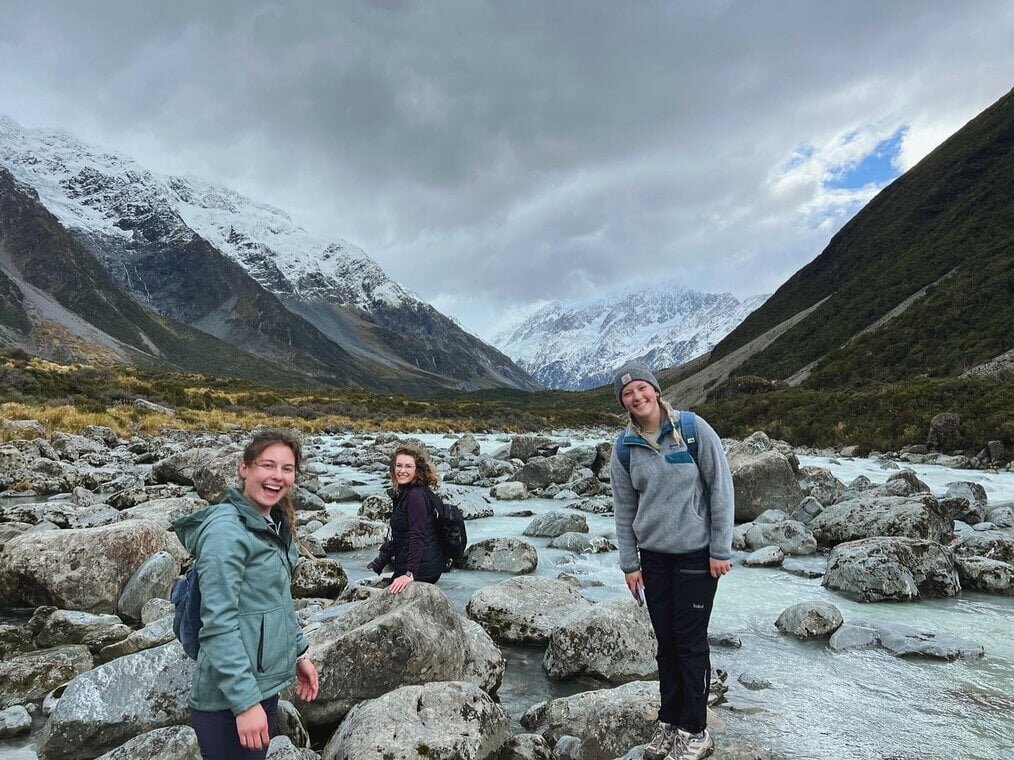
Complete Guide to the New Zealand Working Holiday Visa in 2025
Learn how to secure a Working Holiday Visa in New Zealand to fund your travels while you get to know the country and culture.
New Zealand is a dream travel destination for many travelers. But, unless you live in eastern Australia or one of the countries in the Pacific Islands, it isn’t exactly a quick trip.
When considering the time and cost it takes to get there, you may decide you want to spend more than just a couple of weeks traveling around the islands in order to get the best bang for your buck. What if you could not only stay for up to a year to enjoy the sights but legally work, too? You can with the Working Holiday Visa!
What is a working holiday?
A working holiday combines work and travel, allowing you to support your travels abroad through temporary or seasonal jobs in your new country. New Zealand’s special Working Holiday Visa makes it much easier for citizens of 42 countries to legally live, work, and travel in New Zealand for up to a year (or 23 months if you're from the UK or Canada!)
Think of it as a gap year, a career break, or just a really awesome way to travel and explore the sights of New Zealand!
Requirements for the Working Holiday Visa in New Zealand

Requirements vary by country of citizenship so be sure to check the NZ immigration website.
If you’re a US citizen, the New Zealand Working Holiday Visa may be a great fit for you if you:
- Are between the ages of 18 and 30
- Have a passport valid for at least 15 months after arrival in NZ
- Can show proof of a roundtrip ticket or enough money to buy a ticket out of NZ
- Can demonstrate you have access to $4,200 NZD ($2,383 USD) for the duration of your stay
- Have medical insurance that covers hospitalizations
Last but not least, the Working Holiday Visa is ideal if you're adventurous, flexible, and excited to experience New Zealand like a local!
How to apply for the New Zealand Working Holiday Visa
Applying for the New Zealand Working Holiday Visa is simple; you can only apply online!
1. Gather your documents
To apply for the New Zealand Working Holiday Visa, you will need to provide the following documents.
- Copy of your passport photo page
- Bank statement showing you have at least $4,200 NZD ($2,383 USD)
- Copy of a medical insurance policy
- Proof of a plane ticket leaving NZ at the end of your visa or a sufficient amount of money beyond the $2,383 USD to buy one
Depending on your country of citizenship and length of stay, you may be asked to also provide a medical clearance form (with chest X-ray) from your doctor and/or a police background check.
2. Apply online
First, you need to create a free account on the New Zealand Immigration website. Here you can enter your information, upload your documents, and answer the questionnaires on your health and character.
Once you’re ready to submit, you’ll be prompted to pay the application fee. For US applicants, this is currently $770 NZD ($430 USD) and can be paid with a credit or debit card (Visa, Mastercard, or UnionPay). If your visa is denied, this cost of the application fee is non-refundable.
If immigration authorities require extra paperwork after you submit your application, they’ll contact you by email – make sure to check your spam folder regularly!
3. Get approved
When your visa is approved, you’ll get an email letting you know your status has changed. You can then log on to access your eVisa. Print out this document and take it with you, along with your passport, when you set off for your working holiday. Super easy!
4. Pack your bags
Traveling light is the way to go, especially if you plan to be frequently on the move. Try to pack just the essentials like medication, identity documents, a small laptop or tablet, a sturdy pair of shoes, and your camera. You can buy clothes and other gear as needed once you’re there.
If you’re from the Northern Hemisphere, keep in mind that the seasons are flipped. So if you’re heading to NZ in your summer, it will be their winter!
Popular Working Holiday jobs in New Zealand

The best working holiday jobs tend to be in fields where it’s easy to get temporary work. This will allow you to jump in and out of positions across the country as you travel. Here are some of the most popular fields to look into when on your working holiday.
- Agriculture: From fruit picking and crop planting to animal care, opportunities in agriculture are abundant.
- Hospitality: Around the globe, there is no shortage of jobs in restaurants, bars, hotels, and hostels and New Zealand is no different!
- Tourism: The country’s amazing natural landscapes make it a popular destination for adventure and ecotourism. If you have some experience, consider working as a ski, surf, or scuba instructor, or consider being a tour, climbing, or hiking guide.
- Retail: While not the most glamorous of working holiday jobs, positions in grocery stores, clothing shops, and sporting goods stores are great for entry-level workers.
- Temp agency: Temp agencies exist to fill temporary roles, which is perfect for someone looking for short-term placements. Let them know you’re up for any job anywhere – hopping roles could be the best way to see the country!
If you have specialized experience, licensure, or qualifications, you are also welcome to seek roles in your field. Gaining recognition for a US RN license, for example, might be more legwork but it’s possible!
Working Holiday programs in New Zealand
Want a stress free way to guarantee a job and prepare for your new life abroad before you head over to New Zealand? Signing up for a Working Holiday program has a ton of benefits!
- 24/7 Support: Doing your Working Holiday through a program provider means traveling with a support system that is there whenever you need it. Knowing someone has your back if you run into trouble provides a serious sense of security!
- Job placement: If you apply for the visa on your own, you’ll also need to find a job on your own, too. Program providers have connections to open positions across New Zealand and can get you set up with a job interview before you even arrive.
- Visa assistance: Applying for a visa means a lot of paperwork. Program providers make sure your application is complete and are there for any questions you have along the way.
- Guidance: From housing assistance to sightseeing advice, a team of local experts is on hand to support your new adventure in New Zealand.
GO has several fabulous options to choose from and best of all, they’re reviewed by travelers like you! For example,Global Work & Travel has helped many travelers land jobs in New Zealand, and build community through perks like traveler meet-ups and hosted excursions.
If you’re an inexperienced or anxious traveler or simply just can’t be bothered to undertake all the paperwork and legalities on your own, working with a program provider will make the process smooth and easy so you can focus on the important stuff: travel!
Work and travel in NZ in 2025!
With the Working Holiday Visa, you can earn some cash, build your resume, and make memories to last a lifetime as you travel across New Zealand’s stunning landscapes. What better way to spend a year?






